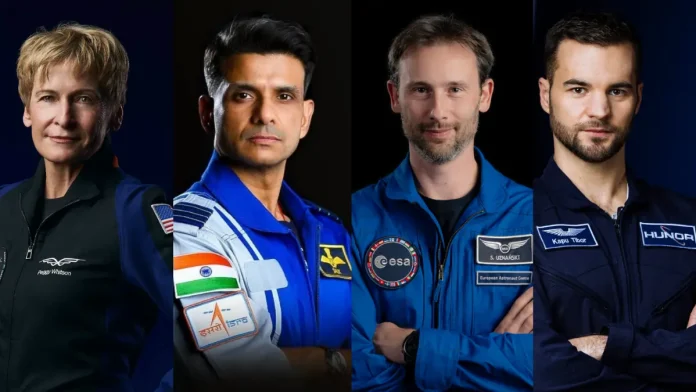On June 26, 2025, India marked a monumental milestone in its space exploration journey as Group Captain Shubhanshu Shukla, an Indian Air Force (IAF) pilot and Indian Space Research Organisation (ISRO) astronaut, became the first Indian to set foot on the International Space Station (ISS).
The Axiom-4 mission, a collaborative effort between NASA, Axiom Space, and SpaceX, successfully docked its Dragon capsule, named “Grace,” with the ISS at approximately 4:30 PM IST, after a 28-hour journey from NASA’s Kennedy Space Center in Florida.
This historic event, following multiple delays, not only signifies India’s return to human spaceflight after a 41-year gap but also underscores the nation’s growing prowess in the global space arena.
A Historic Launch: A New Dawn for India’s Space Program
The Axiom-4 mission lifted off on June 25, 2025, at 12:01 PM IST (2:31 AM EDT) from Launch Complex 39A at NASA’s Kennedy Space Center.
The SpaceX Falcon 9 rocket propelled the Dragon spacecraft into orbit, carrying a four-member crew led by mission commander Peggy Whitson, a former NASA astronaut and Axiom Space’s Director of Human Spaceflight.
Alongside Whitson were mission pilot Shubhanshu Shukla from India, and mission specialists Sławosz Uznański-Wiśniewski from Poland and Tibor Kapu from Hungary.
This diverse crew represents a landmark moment for international collaboration, with India, Poland, and Hungary returning to human spaceflight after more than four decades.
Minutes after reaching orbit, Shubhanshu Shukla’s voice echoed from the Dragon capsule: “Namaskar, mere pyaare desh vasiyon. What a ride! We are orbiting Earth at a velocity of 7.5 km per second.”
His words, carrying the Indian tricolor on his shoulder, resonated with 1.4 billion Indians, as Prime Minister Narendra Modi noted, “Shubhanshu Shukla carries with him the wishes, hopes, and aspirations of 1.4 billion Indians.”
This mission marks a significant step toward India’s ambitious goal of establishing its own space station by 2035 and preparing for the Gaganyaan mission, the country’s first crewed spaceflight program, slated for 2027.
The Journey to the ISS: A Precision Dance in Space
The journey to the ISS was a testament to the precision and technological sophistication of modern space exploration.
After launching into a 200-km orbit, the Dragon capsule, equipped with 16 Draco thrusters, executed a series of complex orbital maneuvers—phasing burns, boost, close co-elliptic, transfer, and final co-elliptic burns—to synchronize its orbit with the ISS, which orbits at approximately 418 km above Earth.
The docking process, largely automated, was closely monitored by Shukla, who served as the mission pilot. The capsule approached the ISS’s Harmony module at a cautious pace, moving at just a few centimeters per second.
The docking sequence began with a soft capture at 4:02 PM IST, as magnetic guides gently aligned the spacecraft with the ISS’s docking port.
This was followed by a hard capture at 4:16 PM IST, where mechanical latches secured an airtight connection. Engineers on Earth conducted pressure and leak checks before approving the hatch opening, which occurred around 6:10 PM IST.
The successful docking was celebrated as a historic moment, with Union Minister Jitendra Singh stating,
“Shubhanshu stands at the threshold entrance of the International Space Station, as the world watches with excitement and expectation.”
Shubhanshu Shukla: A Trailblazer in Space
Born on October 10, 1985, in Lucknow, Uttar Pradesh, Group Captain Shubhanshu Shukla is a decorated IAF test pilot with over 2,000 hours of flying experience across aircraft like the Su-30 MKI, MiG-21, MiG-29, Jaguar, Hawk, Dornier, and An-32.
Commissioned into the IAF in 2006, Shukla’s journey to space began in 2019 when ISRO selected him for astronaut training at Russia’s Yuri Gagarin Cosmonaut Training Center.
Promoted to Group Captain in March 2024, he is also an astronaut-designate for the Gaganyaan mission.
Shukla’s role as the pilot of the Axiom-4 mission is a source of pride for India.
His crewmates lauded his expertise, with Peggy Whitson noting, “Having him as my pilot in the Dragon capsule is great. He’s just wicked smart when it comes to spacecraft technologies.”
Polish astronaut Sławosz Uznański-Wiśniewski described him as “very focused,” while Hungarian astronaut Tibor Kapu praised his wisdom, humorously remarking, “Shux could be 130 years old with the knowledge he possesses.”
Shukla’s message from space emphasized collective effort: “This is not the start of my journey to the ISS but the start of India’s human space program.”
Scientific Endeavors: Experiments in Microgravity
The Axiom-4 crew is set to spend 14 days aboard the ISS, conducting over 60 scientific experiments and outreach activities involving 31 countries.
India’s contribution includes seven critical experiments, ranging from studying microalgae growth in microgravity to investigating tardigrades—microscopic organisms known for surviving extreme conditions.
These experiments aim to identify sustainable food sources, such as sprouting green gram (moong) and fenugreek, and explore their potential in life support systems for future space missions.
Other studies focus on muscle loss in microgravity, cognitive impacts of computer screen use, and microbial behavior in space.
These experiments are pivotal for India’s Gaganyaan program, providing valuable data on life-support systems, docking procedures, and microgravity conditions.
ISRO Chairman V. Narayanan, present in the U.S. for the launch, highlighted the mission’s role in building operational expertise for India’s future crewed missions.
The collaborative nature of Axiom-4, involving NASA, ISRO, the European Space Agency (ESA), and Hungary’s HUNOR program, underscores the global effort to advance space research.
A Symbol of International Collaboration
Axiom-4 is the fourth private astronaut mission organized by Axiom Space, a Houston-based company, in partnership with NASA and SpaceX. It exemplifies the growing role of commercial entities in space exploration, democratizing access to low Earth orbit.
The mission also marks a historic return to human spaceflight for Poland and Hungary, with Sławosz Uznański-Wiśniewski and Tibor Kapu becoming the first astronauts from their respective countries to visit the ISS.
The crew’s diversity reflects the mission’s ethos of global cooperation, as President Droupadi Murmu noted, “The Axiom-4 mission proves the world is indeed one family—Vasudhaiva Kutumbakam.”
The mission faced multiple delays, initially scheduled for May 29, 2025, due to issues ranging from a fuel leak in the Falcon 9 rocket to a leak in the ISS’s Zvezda module.
NASA and Roscosmos collaborated to resolve these challenges, ensuring the mission’s safety. The successful launch and docking highlight the robust partnership between these agencies and the private sector.
National Pride
The launch and docking sparked celebrations across India, particularly in Shukla’s hometown of Lucknow, where his parents and students gathered to watch the live telecast.
His mother, Asha Shukla, was visibly emotional, while his sister, Shuchi Mishra, expressed hope for his safe return after the 15-day mission.
The presence of a soft toy swan named “Joy,” chosen by Shukla’s six-year-old son Kiash, added a heartwarming touch, serving as the mission’s zero-gravity indicator.
Prime Minister Modi, Union Minister Jitendra Singh, and President Murmu congratulated Shukla, emphasizing the mission’s significance for India’s space ambitions.
The Indian Air Force described it as a “déjà vu moment,” recalling Rakesh Sharma’s 1984 flight aboard the Soviet Soyuz T-11.
Sharma himself shared insights from his journey, noting the thrilling reentry and expressing pride in Shukla’s achievement.
Looking Ahead: India’s Space Future
The Axiom-4 mission is a stepping stone for India’s Gaganyaan program, which aims to send astronauts to low Earth orbit by 2027.
Shukla’s experience will provide critical insights into crewed mission operations, paving the way for India’s independent space endeavors.
The mission also highlights the growing role of private companies like Axiom Space and SpaceX in facilitating international spaceflight, signaling a new era of commercial space exploration.
As Shubhanshu Shukla floats in microgravity, conducting experiments and representing India on the global stage, his journey inspires a new generation of scientists, engineers, and dreamers.
The Axiom-4 mission is not just a personal triumph but a bold statement of India’s emergence as a leader in space innovation and international collaboration.

